Free home visits
with a local audiologist

Head of Online Medical Content

Audiology Expert at Hearing Aid UK

As an independent supplier of leading hearing aid brands, we are in a unique position to support, advise and put you in touch with the right audiologist locally who can improve your hearing if your hearing test indicates a hearing loss.
We have access to all the main hearing aid brands in the industry. Unlike some of our competitors, we are not affiliated with any hearing aid brands, we can offer our customers a limitless choice of hearing aids and, along with your preferences, we can assist you in making the right choice of device for your lifestyle, hearing loss and much more.
We understand how challenging it can be to find a hearing aid especially if you've never worn a hearing aid or even if you have and are looking to upgrade. Before you embark on this journey, it is important for you to spend some time researching hearing loss, your local audiologist, hearing care services, the different hearing aids available and familiarising yourself with the hearing aid brands in the industry.
But what are the best hearing aid brands? What is the hearing aid brand's history? What are the Danish hearing aid brands? Which ones are the Demant hearing aid brands? Let's take a look...
On this page, we focus on the main digital hearing aid brands in the audiology industry, a little bit about their history, the technology they provide and how they compare to each other. You may be wondering why researching hearing aid brands is an important part of your hearing loss journey and hearing aid process.
The simple answer to this is that each hearing aid brand displays technical innovation in different ways. What one hearing aid brand has to offer in terms of technology, style, hearing experience, connectivity and features might not include the right hearing aid for you and your hearing loss.
When researching hearing aids, looking at both the hearing aid brand and the devices they offer is crucial to narrowing down the list of potential hearing solutions. However, after your hearing test, your audiologist will look at the results from your audiogram and advise won hat hearing aids will benefit you the most.
This will be determined by the level of hearing loss, amplification needed, your lifestyle, expectations, connectivity required and what features you might need.

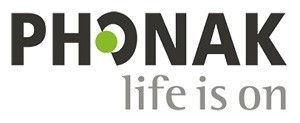
This hearing aid brand was founded in Switzerland in 1947 and belongs to the Sonova Group, which also owns Unitron. Another interesting fact - Sonova also owns the majority shareholding of Boots Hearingcare. Currently, Phonak is the biggest manufacturer of hearing aids worldwide.
Phonak's company mission has always been to create hearing devices that improve the quality of life and reduce the limitations of hearing loss. Phonak prides itself in offering innovation, a variety of models, styles and advanced hearing aids for children. Therefore, offering a choice of makes, and models for all ages, all levels of hearing loss and individual preferences.
Phonak is also the first hearing aid brand to launch the world's first Bluetooth streaming hearing aid from any Bluetooth device directly without the need for a go-between streamer accessory. Previously, it was only iPhone users who could access this connectivity.
Praise was given to Phonak for this, as over 80% of the world owns Android smartphones. Therefore, those with hearing loss who had an Android phone missed out on this beneficial connectivity.
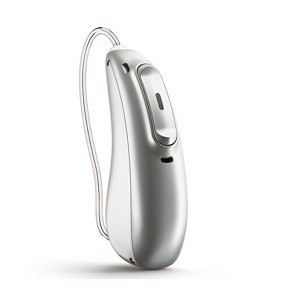
The hearing aid technology levels are named 90, 70, 50 and 30. The higher the number, the higher the technology level and the more expensive the model.
Each model in each Phonak range has a different name. These are Nano (invisible in the ear), Virto (in the ear), Audeo (tiny behind the ear), Bolero (behind the ear) and Naida (the power behind the ear).
![]()
This hearing aid brand is owned by Danish company Demant A/S, which also owns Bernafon and hearing aid retailer Hidden Hearing. Oticon is one of the world's leaders in hearing aid innovation and was founded in 1904 by one man's dedication to improving his wife's hearing loss. Ever since then their motto has always been 'people first'.
Their most praised hearing aid would be the Opn S, which builds on the already brilliant model, the Opn.
![]()
The technical specification for each range is labelled as 1, 2 and 3 - with 1 being the highest level.
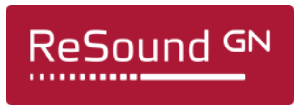
This Danish hearing aid brand is part of the GN Group (Great Nordic), which used to trade as GN Resound. They were the original innovators of the first open-fitting hearing aids and 'made for iPhone' hearing aids. Resound has consistently led the industry in terms of technology, which is mainly due to its having over 147 years of experience in the audiology world.
Their main focus continues to bring consumers a natural and realistic experience, along with the connectivity that is expected in this modern, fast-paced world.
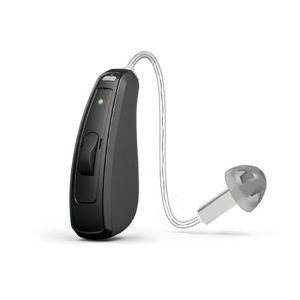
This hearing aid brand has six technology levels. These are 9, 7, 5, 4, 3 and 2. The higher the number, the greater the technology.
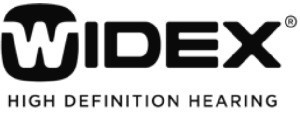
Widex is a Danish hearing aid brand founded in 1956 by Christian Topholm and Erik Westermann as a family business. In 2019 ,they merged with Sivantos, and together they are known as WS Audiology. However, they still remain separate, as both manufacturers have different philosophies and offer unique products to consumers.
They remain one of the industry's leaders in hearing aid innovation and now manufacture hearing aids in over 100 countries. Widex's main focus is providing those with hearing loss the ability to differentiate between background noise and conversation easily, in all challenging environments.
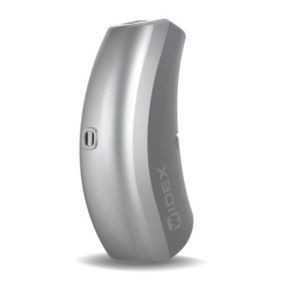
Widex labels their hearing aid technology levels as 440, 330, 220 and 110. 440 being the highest technical specification.
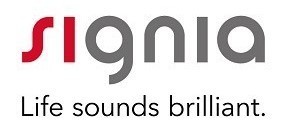
Signia's hearing aid brand legacy started as Siemens in 1978 by Werner Von Siemens. He designed an enhanced telephone receiver for people who have hearing loss to better understand conversations on the phone.
Siemens was purchased by the Sivanto Group in 2015 and chose to rebrand Siemens as Signia. Before this, Siemens was renowned for making average hearing aids, but now, with this collaboration, they are creating better hearing aids and more advanced technology for their consumers.
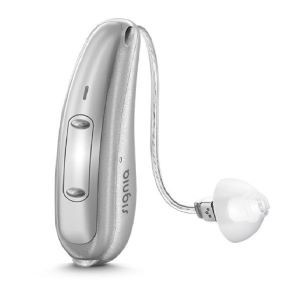
Signia's technology levels in all their ranges are named 7, 5 and 3, 7 being the greatest technology.

Bernafon was founded by Hans Gfeller in Switzerland in 1946. This hearing aid brand is currently sold in 70 countries worldwide and is a part of the Demant Group, which also owns hearing aid brands Oticon and Sonic. Their hearing devices are famous for providing natural sound to the wearer without great expense.
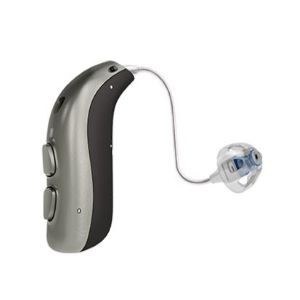
9, 7, 5, 3 and 1 - the higher the number, the greater the technical specification.
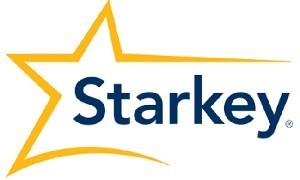
This hearing aid brand is the only American one, as three out of the six big ones come from Denmark - their HQ is based in Minnesota, USA. They are also privately owned by the Texan billionaire, Bill Austin. In recent years, Starkey has established itself as one of the hearing aid brands that has shown great innovation in both technology and design.
The story of Starkey began in 1963 when Harold Starkey first opened his workshop before Bill Austin bought the brand in 1967. They are also famous for their charitable work, establishing their Starkey Hearing Foundation in 1984 to support those with hearing loss and providing over 1 million people around the world with hearing aids.
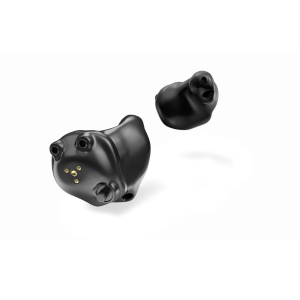
1000, 1200, 1600, 2000 and 2400 being the highest specification.

This hearing aid brand, founded in 1964, is owned by the Swiss company Sonova and is based in Canada's 'Silicon Valley' in Ontario. Sonova also owns Phonak and the majority shareholding of Boots Hearingcare. In effect, Unitron is the cheaper alternative to Phonak hearing aids, as they are a part of the same company.
Very similar to Volkswagen and Audi. Unitron has always worked closely with health professionals and academics to better understand what hearing experience consumers want and need.
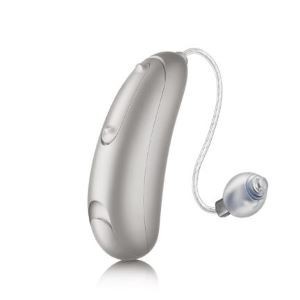
800, 700, 600, 500 and 9, 7, 5 and 3. The higher the number, the greater the technology.
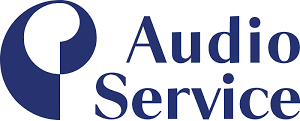

Founded in 1977, the Lohne-based hearing aid brand's focus has always been on service orientation and providing innovation to its consumers. Audio Service was also the first hearing aid brand to produce custom hearing aids in Germany.
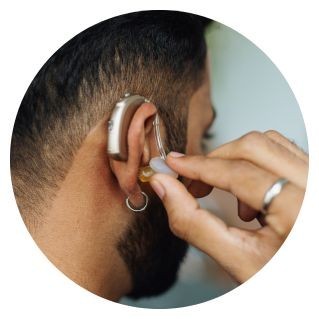
As we mentioned earlier, when researching hearing aid devices it is important to explore the comparison of hearing aid brands available in the UK. To find out the hearing aid brands list and prices available in the UK and what we offer, please click on the hearing aid brand list links below.
We always publish our hearing aid prices for all the hearing aid brands we offer, giving you complete transparency with what you actually get when you purchase your hearing aids. You can also see what rating each hearing aid has been awarded for reference, which you might find useful.
To make it easier to compare hearing aid brands' ratings, we rate all our hearing aids from one to five stars. These can be viewed throughout our price list, product pages and range pages for complete transparency.
You can also find some of the latest reviews on hearing aid brands and products within our customer reviews here
It's important to note that individual preferences, hearing needs, and the guidance of an audiologist or hearing professional should ultimately guide the selection of a hearing aid brand and model. It is advisable to consult with a hearing healthcare professional to determine the most suitable brand and device based on your specific requirements.
If you would like any more information about the best hearing aid brands we offer or if you have any other hearing healthcare enquiries - please call us free on 0800 567 7621
 Hearing Aid Brands UK
Hearing Aid Brands UK 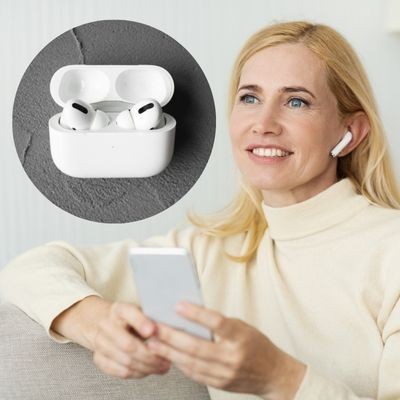 Risks of Wearing Apple AirPods Pro 2
Risks of Wearing Apple AirPods Pro 2  Supporting a Loved One with Hearing Loss
Supporting a Loved One with Hearing Loss Do not spend hundreds of pounds without getting a second opinion from us.
 Not only are the prices great, but the service is fantastic! Many thanks to your team.
Not only are the prices great, but the service is fantastic! Many thanks to your team.If you are looking at this page then it is likely that an audiologist has suggested that you purchase this particular hearing aid, so is this the best model for you?
In general, any audiologist will always be recommending to you the model that best suits your needs. Here is a useful checklist to make sure that is the case.
If in doubt, feel free to give us a call. That's what we're here for. In the meantime, read all about our review of the best hearing aids here
If you have significant hearing loss in both ears, you should be wearing two hearing aids. Here are the audiological reasons why:
Localisation: The brain decodes information from both ears and compares and contrasts them. By analysing the minuscule time delays as well as the difference in the loudness of each sound reaching the ears, the person is able to accurately locate a sound source. Simply put, if you have better hearing on one side than the other, you can't accurately tell what direction sounds are coming from.
Less amplification is required: A phenomenon known as “binaural summation” means that the hearing aids can be set at a lower and more natural volume setting than if you wore only one hearing aid.
Head shadow effect: High frequencies, the part of your hearing that gives clarity and meaning to speech sounds, cannot bend around your head. Only low frequencies can. Therefore if someone is talking on your unaided side you are likely to hear that they are speaking, but be unable to tell what they have said.
Noise reduction: The brain has its own built-in noise reduction which is only really effective when it is receiving information from both ears. If only one ear is aided, even with the best hearing aid in the world, it will be difficult for you to hear in background noise as your brain is trying to retain all of the sounds (including background noise) rather than filtering it out.
Sound quality: We are designed to hear in stereo. Only hearing from one side sounds a lot less natural to us.
Fancy some further reading on this topic? You can read about why two hearing aids are better than one in our article, hearing aids for both ears, here
For most people, the main benefit of a rechargeable hearing aid is simple convenience. We are used to plugging in our phones and other devices overnight for them to charge up. Here are some other pros and cons:
For anybody with poor dexterity or issues with their fingers, having a rechargeable aid makes a huge difference as normal hearing aid batteries are quite small and some people find them fiddly to change.
One downside is that if you forget to charge your hearing aid, then it is a problem that can't be instantly fixed. For most a 30-minute charge will get you at least two or three hours of hearing, but if you are the type of person who is likely to forget to plug them in regularly then you're probably better off with standard batteries.
Rechargeable aids are also a little bit bigger and are only available in Behind the Ear models.
Finally, just like with a mobile phone, the amount of charge you get on day one is not going to be the same as you get a few years down the line. Be sure to ask what the policy is with the manufacturer warranty when it comes to replacing the battery.
Looking for more information on rechargeable hearing aids? Read our dedicated page on the topic here
For most people, the answer is yes. But it's never that simple.
The majority of hearing problems affect the high frequencies a lot more than the low ones. Therefore open fitting hearing aids sound a lot more natural and ones that block your ears up can make your own voice sound like you are talking with your head in a bucket. Therefore in-ear aids tend to be less natural.
However the true answer is we can't tell until we have had a look in your ears to assess the size of your ear canal, and until we have tested your hearing to see which frequencies are being affected.
People with wider ear canals tend to have more flexibility, also there are open fitting modular CIC hearing aids now that do not block your ears.
There is also the age old rule to consider, that a hearing aid will not help you if it's sat in the drawer gathering dust. If the only hearing aid you would be happy wearing is one that people can't see, then that's what you should get.
Most people can adapt to any type of hearing aid, as long as they know what to expect. Have an honest conversation with your audiologist as to what your needs are.
Generally speaking, six or more. Unless it's none at all.
The number of channels a hearing aid has is often a simplistic way an audiologist will use to explain why one hearing aid is better than another, but channels are complex and it is really not that straightforward. Here are some reasons why:
Hearing aids amplify sounds of different frequencies by different amounts. Most people have lost more high frequencies than low and therefore need more amplification in the high frequencies. The range of sounds you hear are split into frequency bands or channels and the hearing aids are set to provide the right amount of hearing at each frequency level.
Less than six channels and this cannot be done with much accuracy, so six is the magic number. However, a six channel aid is typically very basic with few other features and is suitable only for hearing a single speaker in a quiet room. The number of channels is not what you should be looking at, it's more the rest of the technology that comes with them.
As a final note, different manufacturers have different approaches. One method is not necessarily better than any other. For example, some manufacturers have as many as 64 channels in their top aids. Most tend to have between 17 and 20. One manufacturer has no channels at all.
Hearing aids are easily lost, misplaced or damaged and typically are one of the most expensive personal possessions an individual can own. We offer hearing aid warranty coverage for £80 per year per aid. Find out more about this service we provide here
All our audiologists use the very latest technology and provide the full range of tests to accurately measure your hearing for free. Find out about what hearing healthcare services we offer all our customers here
Hearing Aid UK offers all their customers free home visiting services, even in a care home environment, for no extra cost. Including hearing tests, fittings, maintenance, check-ups and much more in the comfort of your own home and at your convenience. Find out more information about our home visits here
Here, at Hearing Aid UK, we are dedicated to offering low hearing aid prices. We achieve this by having no head office and low marketing costs. Our hearing aid prices are amongst the lowest you will find anywhere in the world. Explore our prices, brands, and models here
When we refer to a product as 'Latest Launch', we mean it is the latest to be released on the market.
When we refer to a product as 'New', we mean that the product is the newest hearing aid model on the market.
When we refer to a product as 'Superseded', we mean that there is a newer range available which replaces and improves on this product.
When we refer to a product as an 'Older Model', we mean that it is has been superseded by at least two more recent hearing aid ranges.